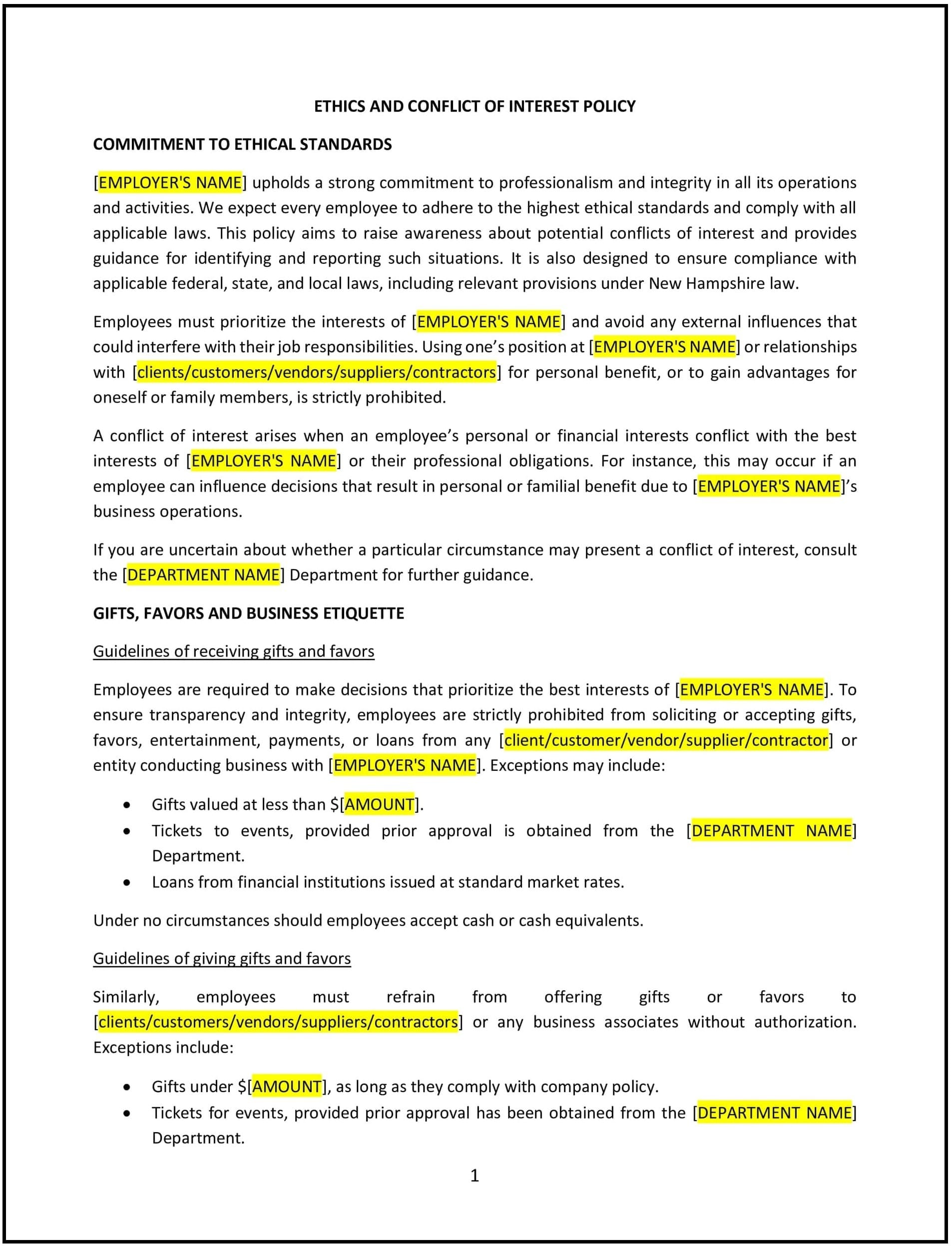Ethics and conflict of interest policy (New Hampshire): Free template
Got contracts to review? While you're here for policies, let Cobrief make contract review effortless—start your free review now.

Customize this template for free
Ethics and conflict of interest policy (New Hampshire)
An ethics and conflict of interest policy helps New Hampshire businesses maintain integrity, transparency, and accountability by providing clear guidelines for identifying, disclosing, and managing potential conflicts of interest. This policy outlines expectations for employees to avoid situations where personal interests may conflict with their professional responsibilities, thereby protecting the company’s reputation and ensuring fair decision-making.
By adopting this policy, businesses in New Hampshire can foster a culture of ethical behavior, build trust with employees and clients, and mitigate risks related to unethical practices or conflicts of interest.
How to use this ethics and conflict of interest policy (New Hampshire)
- Define conflicts of interest: Clearly explain what constitutes a conflict of interest, including situations where an employee’s personal interests or relationships could influence their professional decisions or actions.
- Outline disclosure requirements: Specify how employees should disclose potential conflicts of interest, including the process for reporting, the timeline for disclosure, and the information required.
- Establish approval process: Define how potential conflicts will be reviewed and managed, including who will assess the conflict and what steps will be taken to resolve it, such as recusal from decision-making or reassignment of duties.
- Prohibit certain activities: Identify specific activities that are prohibited, such as accepting gifts or benefits from suppliers or clients, engaging in outside business ventures that compete with the company, or using company resources for personal gain.
- Provide guidance on ethical behavior: Offer examples of ethical behavior and decision-making to help employees navigate complex situations where the line between personal interests and professional responsibilities may not be clear.
- Implement training and education: Offer training to employees and management on the importance of ethics and conflict of interest management, as well as how to recognize and handle potential conflicts in the workplace.
- Review and update: Regularly review the policy to reflect changes in New Hampshire regulations, industry standards, or company operations, and update the policy as needed to ensure it remains effective.
Benefits of using this ethics and conflict of interest policy (New Hampshire)
This policy provides several benefits for New Hampshire businesses:
- Promotes transparency and trust: A clear and consistently enforced policy helps build trust with employees, clients, and stakeholders by demonstrating a commitment to ethical behavior and transparency.
- Protects the company’s reputation: By addressing conflicts of interest, businesses can avoid situations that could harm their reputation or result in legal or financial consequences.
- Enhances decision-making: Employees are better able to make impartial, objective decisions when conflicts of interest are addressed, helping to improve business outcomes and maintain fairness.
- Reduces legal risks: A well-implemented policy helps businesses avoid legal issues arising from unethical practices or the appearance of conflicts of interest, protecting the company from potential lawsuits or regulatory penalties.
- Fosters an ethical workplace culture: By establishing expectations for ethical behavior and conflict resolution, businesses create an environment where employees feel valued and motivated to act with integrity.
Tips for using this ethics and conflict of interest policy (New Hampshire)
- Communicate the policy clearly: Ensure all employees are aware of the ethics and conflict of interest policy, understand its importance, and know how to disclose potential conflicts.
- Foster an open environment: Encourage employees to raise concerns about potential conflicts without fear of retaliation, creating an environment where ethical issues can be openly discussed and addressed.
- Lead by example: Leadership should model ethical behavior and decision-making, demonstrating the importance of following the policy and setting the tone for the rest of the organization.
- Provide ongoing training: Offer regular ethics training to employees, including real-world examples and guidance on how to handle common conflict of interest scenarios.
- Regularly monitor compliance: Continuously monitor and review the implementation of the policy, addressing any issues promptly and ensuring that conflicts are managed appropriately.